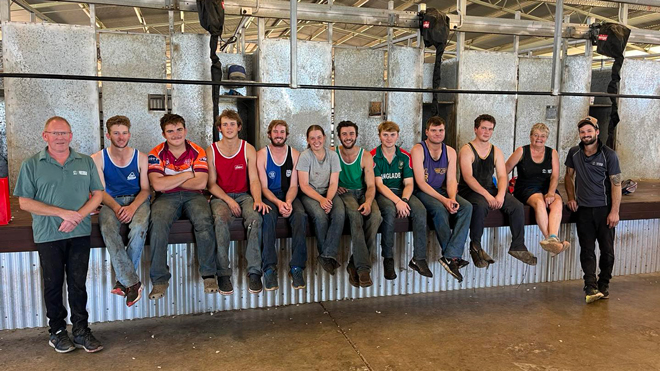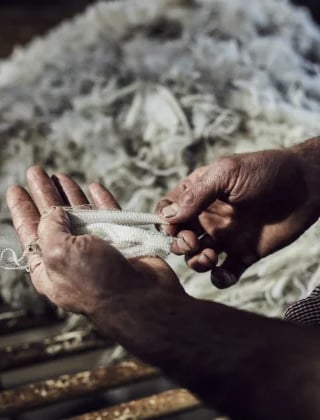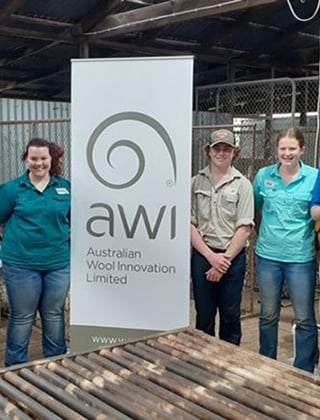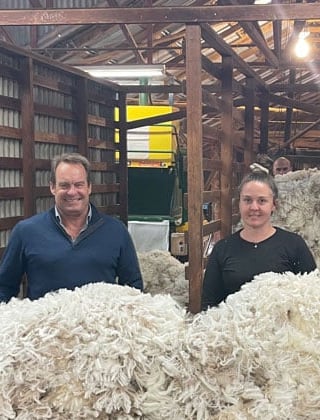Shearer & Wool Handler Training

AWI funds hands-on, practical, in-shed training for shearers and wool handlers across the country to attract and retain new entrants into the wool harvesting industry, build the capacity and longevity of existing staff, and increase returns to woolgrowers through improved clip preparation practices.
AWI National Manager, Wool Harvesting Training & Careers Development, Craig French, says AWI has responded to the heightened pressures of woolgrowers seeking wool harvesting staff in the past 12 months by putting extra resources into the training of shearers and wool handlers.
“During the past financial year, more than 500 new entrants into the industry have received AWI-funded novice training, while an additional 203 learner shearers have taken up shearing full time and been issued with an AWI Learner Shearer Toolkit (containing a handpiece and shearing gear). Our analysis shows that 95% of learner shearers that have been issued with a learner toolkit have stayed in the industry.
“While continuing to put significant resources into shearer training next year, AWI will also put a renewed focus on training new entrant wool handlers. The demand for wool handlers is very evident – with longer periods of no work through the winter, a lot of workers leave to secure non-disruptive full-time work in other industries.
“The retention rates of trained participants across all categories of shearing and wool handling stands at 81%, with wool handlers making up a large majority of the remaining 19% that have left the industry.”
AWI-funded trainers carry out wool harvesting training in New South Wales, Western Australia, Queensland and Tasmania. In Victoria and South Australia, the AWI-funded training is provided by the Shearing Contractors Association of Australia Shearer Woolhandler Training Inc (SCAA SWTI).
AWI thanks all the woolgrowers who provide their facilities and sheep, and all the other organisations and individuals that lend their time and resources to help run this training.
Pictured below is a small selection of AWI-funded courses recently run across the country.

Left: Ballarat, Vic | Center: Cleve, SA | Right: Colac, Vic

Left: Cooma, NSW | Center: Oakden Hills, SA | Right: Tambo, VIC
More information: To arrange training in your state, email craig.french@wool.com. Keep an eye on the Facebook channels of AWI @australianwoolinnovation and SCAA SWTI @shearerwoolhandlertraining (Vic and SA) for the latest updates.
Novice wool harvesting course at Muresk, WA

The participants who completed the novice wool harvesting course at Muresk in June.
Making the most of the newly built six-stand shearing shed at the state government’s Muresk Institute at Northam, 100 km east of Perth, AWI held its inaugural novice wool harvesting course at the Institute in June which was attended by 10 keen participants.
Aged 17 to 40, most participants had little experience of shearing or wool handling prior to joining the course, but during the five-day course they were provided with a solid introduction to the wool harvesting industry to make them job-ready for shed work, thereby helping build the wool harvesting workforce.
Participants learnt a range of skills including the details of crutching and shearing, handpiece maintenance, wool handling, wool pressing, health and safety, animal welfare, and life skills including the importance of a good work ethic to financial budgeting.
The shed-based, practical training was provided by leading industry trainers Kevin Gellatly and Damien Boyle for the shearing and Amanda Davis for wool handling.
“The 10 participants were a very industry-focused group, with all having great communication skills matched by an awesome work ethic. They were keen to learn all the principles we taught them to make them successful in the wool industry. Together, we achieved some great outcomes,” Amanda said.

“Every single one of the 420 sheep provided by woolgrower Paul Antonio of Southern Brook for use during the course were shorn by the students. It was a very successful course and one that AWI hopes to run again in the future.”
The courses are fully funded by AWI and are offered at no cost to eligible participants. It is a live-in course, with the accommodation for this particular course provided by the Muresk Institute.
AWI-funded novice wool harvesting courses are run across the country and are suitable for participants ranging from wool handlers looking to learn new skills in shearing, farm workers wanting to gain experience in shearing and wool handling, and those new to the shearing industry.
By the end of the course, participants should be able to shear a minimum of 40 adult Merino sheep or 50 adult crossbred sheep per day to an acceptable industry standard, so that they may be employable as a ‘learner shearer’ in a commercial wool harvesting operation.
Crutching school at Muresk
Earlier in the year, in March, AWI also held a two-day crutching school at the Muresk Institute in Western Australia to provide participants with the basic skills of crutching.
With an emphasis on safety as well as productivity, the participants were taught best practice catch and drag, correct positioning of the sheep and crutcher, and handpiece maintenance. AWI crutching schools are suitable for participants ranging from wool handlers looking to learn new skills in crutching to farm workers wanting to gain experience in crutching.
“The course at Muresk comprised a great group of students with a mixture of industry workers as well as farm owners and staff learning the principles of how to crutch sheep to help maintain their own flock,” said trainer Amanda Davis.
This article appeared in the September 2023 edition of AWI’s Beyond the Bale magazine. Reproduction of the article is encouraged.















